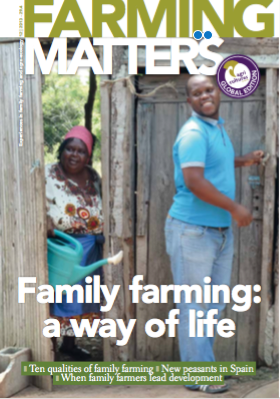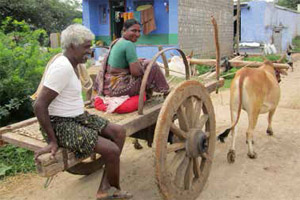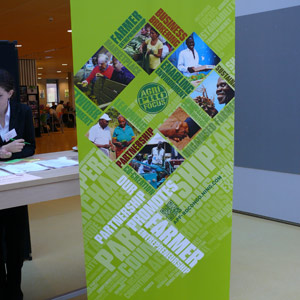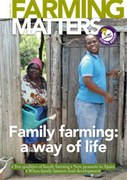AUTHOR
Month: December 2013
Articles
 FAMILY FARMING: A WAY OF LIFE
December 20th, 2013
FAMILY FARMING: A WAY OF LIFE
December 20th, 2013
Farming Matters | 29.4 | December 2013 The year of 2014 has been proclaimed by the UN as the International Year of Family Farming. As several articles in this issue of Farming Matters point put, it makes a great deal of sense to strengthen family farming. In contrast of to what many believe, family farming is not … Read more
Editorial – Women and ecology matter
December 19th, 2013
The year 2014 has been proclaimed by the UN as the International Year of Family Farming (IYFF). As several articles in this issue of Farming Matters point out, it makes a great deal of sense to strengthen family farming. Yet there are powerful forces pulling agriculture into a very different direction, as can be seen … Read more
Opinion: This is the moment
December 19th, 2013
On the eve of the International Year of Family Farming (IYFF), we congratulate the hundreds of organisations and individuals who are committed to participating in it. All of you are doing a great job of communicating and raising awareness. We hope that the IYFF will give a significant boost to the demands of all family … Read more
 Small-scale farmers, big change
December 19th, 2013
Small-scale farmers, big change
December 19th, 2013
The Agricultural Biodiversity Knowledge Programme (agrobiodiversity@knowledged) initiated by Oxfam Novib and Hivos aims to generate and share evidence and insights that will be of value for enhancing agricultural biodiversity. It aims to contribute to a change from mainstream high-input agricultural systems to biodiverse systems that serve farmers and nature; that ensure food and nutrition security; … Read more
 2014: Hope for family farmers
December 19th, 2013
2014: Hope for family farmers
December 19th, 2013
In 2003, African Heads of State made a commitment to invest at least 10% of their national budgets into agriculture by 2015. Many countries are still far from reaching this percentage. And those who have, such as Burkina Faso, are investing in biotechnology, large-scale use of chemical fertilizers, mechanisation, irrigation, pesticides and genetically modified … Read more
 Learning from new peasants
December 19th, 2013
Learning from new peasants
December 19th, 2013
In rural Valencia, Spain, youth unemployment exceeds 50 percent. However, young people are not waiting for outsiders to come and solve their problems. An excursion to local initiatives in the region proved to be a wonderful opportunity to learn from new, young peasants about self-organised development. In June 2013, our group of students visited the … Read more
 Flipping perspectives on learning
December 19th, 2013
Flipping perspectives on learning
December 19th, 2013
Agricultural professionals are increasingly looking for new developments in training methods. We hear many theories about “what works”, but how do we translate these into an effective ways of developing knowledge? The expert meeting “Beyond Knowledge-Sharing” held in Den Bosch (the Netherlands), on October 22 aimed to facilitate this transition from knowledge to practice. “We … Read more
 Agro-ecology: beyond food
December 19th, 2013
Agro-ecology: beyond food
December 19th, 2013
Some may view indigenous communities as being conservative and backwards. However, the Kabekwa (Cabécar) in Costa Rica show that such communities can be adaptable and innovative. This indigenous community has been evolving constantly in response to changing circumstances, while maintaining much of their identity. The Kabekwa have developed agro-ecological farming systems that go far beyond … Read more
Mind! > New Print
December 19th, 2013
Realising farmers’ rights to crop genetic resources: Success stories and best practices Andersen and T. Winge (eds.), 2013. Routledge, Oxon. 214 pages. The diversity of crops enriches our lives with different tastes, smells, nutrients and colours. These traits can equip farmers to meet challenges of marginal soils, crop pests and diseases, drought and changing environmental … Read more
Locally rooted > Ideas and initiatives from the field
December 19th, 2013
Family farmers and the many ways in which they contribute to food security, healthy landscapes and thriving rural communities can be supported in a number of ways. These are some initiatives from around the world. Nepal Women’s leadership In Nepal’s patriarchal society, particularly in rural areas, discrimination of women is still very much part and … Read more
Month: December 2013
 FAMILY FARMING: A WAY OF LIFE
FAMILY FARMING: A WAY OF LIFE
Farming Matters | 29.4 | December 2013 The year of 2014 has been proclaimed by the UN as the International Year of Family Farming. As several articles in this issue of Farming Matters point put, it makes a great deal of sense to strengthen family farming. In contrast of to what many believe, family farming is not … Read more
The year 2014 has been proclaimed by the UN as the International Year of Family Farming (IYFF). As several articles in this issue of Farming Matters point out, it makes a great deal of sense to strengthen family farming. Yet there are powerful forces pulling agriculture into a very different direction, as can be seen … Read more
On the eve of the International Year of Family Farming (IYFF), we congratulate the hundreds of organisations and individuals who are committed to participating in it. All of you are doing a great job of communicating and raising awareness. We hope that the IYFF will give a significant boost to the demands of all family … Read more
 Small-scale farmers, big change
Small-scale farmers, big change
The Agricultural Biodiversity Knowledge Programme (agrobiodiversity@knowledged) initiated by Oxfam Novib and Hivos aims to generate and share evidence and insights that will be of value for enhancing agricultural biodiversity. It aims to contribute to a change from mainstream high-input agricultural systems to biodiverse systems that serve farmers and nature; that ensure food and nutrition security; … Read more
 2014: Hope for family farmers
2014: Hope for family farmers
In 2003, African Heads of State made a commitment to invest at least 10% of their national budgets into agriculture by 2015. Many countries are still far from reaching this percentage. And those who have, such as Burkina Faso, are investing in biotechnology, large-scale use of chemical fertilizers, mechanisation, irrigation, pesticides and genetically modified … Read more
 Learning from new peasants
Learning from new peasants
In rural Valencia, Spain, youth unemployment exceeds 50 percent. However, young people are not waiting for outsiders to come and solve their problems. An excursion to local initiatives in the region proved to be a wonderful opportunity to learn from new, young peasants about self-organised development. In June 2013, our group of students visited the … Read more
 Flipping perspectives on learning
Flipping perspectives on learning
Agricultural professionals are increasingly looking for new developments in training methods. We hear many theories about “what works”, but how do we translate these into an effective ways of developing knowledge? The expert meeting “Beyond Knowledge-Sharing” held in Den Bosch (the Netherlands), on October 22 aimed to facilitate this transition from knowledge to practice. “We … Read more
 Agro-ecology: beyond food
Agro-ecology: beyond food
Some may view indigenous communities as being conservative and backwards. However, the Kabekwa (Cabécar) in Costa Rica show that such communities can be adaptable and innovative. This indigenous community has been evolving constantly in response to changing circumstances, while maintaining much of their identity. The Kabekwa have developed agro-ecological farming systems that go far beyond … Read more
Realising farmers’ rights to crop genetic resources: Success stories and best practices Andersen and T. Winge (eds.), 2013. Routledge, Oxon. 214 pages. The diversity of crops enriches our lives with different tastes, smells, nutrients and colours. These traits can equip farmers to meet challenges of marginal soils, crop pests and diseases, drought and changing environmental … Read more
Family farmers and the many ways in which they contribute to food security, healthy landscapes and thriving rural communities can be supported in a number of ways. These are some initiatives from around the world. Nepal Women’s leadership In Nepal’s patriarchal society, particularly in rural areas, discrimination of women is still very much part and … Read more

